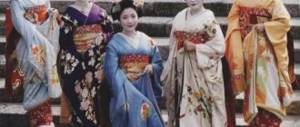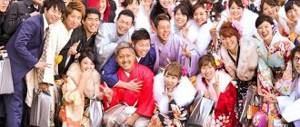Japan only became open to tourists two centuries ago. Until this time, the country was closed to entry and exit from it. Thus acting in the 16th-18th centuries the board wanted to protect their fellow citizens from foreign influence and preserve their Japanese traditions.
The country of Japan opened its borders only in the 19th century Meiji came to power (1868). Thanks to the lifting of the ban, big changes and dramatic changes began. In a fairly short period of time, Japan, due to the adoption of innovations from Western countries, rapidly modernized. But this did not prevent us from preserving all the traditions of Japan , which have remained unchanged to this day.
Ancient traditions and customs of the Japanese
Japan is one of the mysterious countries in the world, because it combines rules that are sometimes incompatible, according to Europeans. For example:
- strictness of discipline and freedom of morals;
- shocking extravagance and exquisite taste;
- unbridledness and complete harmony.
The peculiarity of the Japanese nation is that it honors its traditions, and at the same time is considered one of the leading states on the world stage.
Among the huge number of traditions and customs, I would like to highlight those that are special for every Japanese.
Architectural and entertainment chaos
Despite the fact that the streets here have no names, they are far from faceless. In large populated areas, each of them looks like a colorful kaleidoscope, because everything here is random and chaotic: the architecture of neighboring buildings, their coloring, size, shape, style. The poles and lanterns are lit with lamps in stunning colors from pink to green, the support underneath can be decorated with garish plastic flower bouquets, and below that there are brightly colored advertisements for everything from cigarettes to dating houses.
There are often proudly pompous inscriptions here that the city is a crime-free zone or recognizes the equality of women, and other things that can cause pride in the country and peace of mind for safety.
Rules of conduct and etiquette
The locals are polite and hospitable. Therefore, tourists coming to Japan need to know that the usual handshake is considered offensive . It is customary for the Japanese to bow , thus showing the highest degree of respect for a person. Depending on the depth of the bow, different degrees of respect are expressed. When greeting a salesperson or waiter, the bow should be light. The bow below is intended for employees in senior positions. to bow low to greet the president of a company at work. The lowest bow is marked by the highest degree of respect for people of advanced age, as well as people with the highest rank or status. It should be added that no matter who the bow is intended for, it is forbidden to look into the eyes of the interlocutor. This is considered an insult.
Friend or foe
The inhabitants of the country have a highly developed division between friends and foes. The Japanese can ignore people of other nationalities so much that they literally close the door in their face or fail to hear a direct address. The problem with migrants, which is an eternal headache for European countries, was also very cleverly solved here. For this, one piece of legislation was sufficient, according to which the company must pay any foreigner a salary higher than a Japanese person in an identical position. Therefore, valuable specialists from “gaijin” (outsiders) will always find work here, but immigrants without qualifications will never find work.
Tea culture
The tea ceremony is the oldest of traditions, preserving the established stages of the tea drinking procedure. This is a significant tradition for the Japanese and is honored from generation to generation. A tea ceremony does not necessarily require a special occasion, but it must certainly include all stages of preparation. Features of preparing the main tradition of Japan:
- Guests who have received an invitation must arrive 15-20 minutes before the start of the ceremony. During this time, a tea master ( shokyaku ) is selected who will lead the tea ceremony.
- Regardless of the time of day in the room where tea drinking is taking place, dim the light and close the curtains to create twilight .
- Organizing a small buffet ( kaiseki ) is considered mandatory. After the refreshments, tea drinking begins.
Say a word about sex
Japanese culture has always had a place for topics about sex. Religion not only did not prohibit carnal pleasures, but also encouraged them in every possible way, so the concept of original sin is unfamiliar to the Japanese. If you believe ancient mythology, then even some islands appeared as a result of a sexual relationship between the goddess Izanami and the god Izanagi.
It is not surprising that the “profession” of a geisha in no way desecrated the honor and dignity of a woman. And if they were only the so-called masters of ceremonies, entertaining the men with interesting conversation and games, then the courtesans were much “deeper” in the topic. Moreover, they were also divided by rank, starting from simple bathhouse attendants and servants and ending with VIP-level kept women - santya, tsubona, kosi, tayu. There was an unspoken rule that it was impossible to change girls. Having once chosen one, you had to give it all your attention and money.
The latter fact played an important role in the choice of a courtesan. The man had to provide not only for the girl herself, her food, housing, clothes and leisure, but also for the servants. The most expensive mistresses could cost up to $8,500 per year in local currency. You have to pay for everything, and no matter how sad it may sound, for love too.
Since the 17th century, prostitution was regulated by law, and all non-family intimate life took place in separate neighborhoods - similar to modern red-light streets. There the girls lived and worked, not having the right to leave the territory outlined for them. To get out of the “exclusion zone”, they had to marry their clients. Moreover, the cost of such freedom was very expensive.
Often lovers simply did not have the money to reunite, and they considered couple suicide the only way out. The most amazing thing is that the Japanese did not see anything wrong with this, did not condemn or curse the desperate Romeos and Juliets. It was believed that after committing suicide while holding hands, the couple would definitely be together in their next life.
Food culture
Japanese traditions are also observed when preparing food. No less significant than the tea ceremony is the cultural study of food . The chefs pay special attention to table setting and the dish itself. Before you start eating, you must wipe your face and hands with a special napkin ( oshibori ) soaked in hot water. You also need to adhere to the following rules:
- chopsticks must certainly be placed on a special stand ( hashioki );
- It is prohibited to pass food from your dish;
- It is prohibited to stick chopsticks into rice or cross ;
- It is forbidden to use spoons
- You cannot move plates at the table during lunch or dinner, since each has its own place on the table;
- It is considered disrespectful to move food around the plate, and you should not put a bitten piece on the plate.
Gender education
Until a certain age, girls cannot communicate with the opposite sex; the ban even applies to conversations and, especially, eating together. If a girl dares not only to have a meal in front of a boy, but also to offer him her food during recess, this will be tantamount to a declaration of love and will not go unnoticed by anyone. Schoolboys and schoolgirls blush in each other's company and try to walk in same-sex groups. The more girlfriends or friends gather, the more decent and better, but solo walks are regarded as immoral and impermissible.
Guests further from the door
It would be appropriate to recall the customs of the land of the rising sun regarding the reception of guests . The most honored guests are given places in the house away from the entrance doors . The same applies to the rules for accommodating guests at seminars, conferences, business and scientific events. It should be said that only close relatives are invited to the house, but it is not customary to invite strangers to the family abode. Therefore, meetings are organized in cafes or restaurants.
Kancho - strange entertainment
This ancient Japanese game also stands in stark contrast to the chaste rules of school. The essence of it is to put your palms together and extend your index fingers forward, suddenly stick them into the anus of an unsuspecting victim who is not expecting such a trick. Despite the fact that “fun” is far from harmless, it is mega-popular, especially in elementary grades.
There were incidents when even teachers were convicted of such actions, and the incident was not always strictly condemned by school management. However, the game can be legally recognized as sexual harassment and is ranked 27th on the international community's list of the most dangerous games.
Children are the flowers of life
Family traditions are passed on from generation to generation. The birth of a child in a family is not just joy, but great happiness. Especially if it's a boy. Among the peoples of Japan, it is customary for a child to indulge in everything until he turns five, without fail. But after reaching the age of five, everything changes dramatically . After school starts, the child is taken with a tight rein. From this moment, the child begins to prepare for adult life, where established rules, customs, traditions and rituals must be observed.
The Japanese have preserved quite interesting traditions. For example, the Japanese nation is very clean. The love for cleanliness is brought up from childhood, but the whole family . That is, the whole family bathes in the same water. The oldest members of the family begin the water procedure first, and the youngest members complete the bathing. This water is then used to wash clothes.
To summarize, it should be said that all national traditions are honored not only by the older generation. Young people also treat with respect, but today the younger generation can answer with a nod in parting - bey-bey. The same applies to the national clothes that all residents wore. Nowadays a kimono (or, more correctly, a wafuku) is worn for a celebration or to welcome a welcome guest .
New Year celebration
New Year for the Japanese is not just a fun holiday and a reason to relax for a couple of days, but a whole magical ritual. His arrival is heralded by the loud sounds of bells “working” in all the churches of the country. According to the Buddhist religion, a person has 108 carnal desires, which means that you need to hit exactly that many times to cleanse yourself of old sins and enter the new year cleansed of all negativity.
The holiday is preceded by a feverish bustle, but the Japanese are not preoccupied with preparing Olivier and Napoleon, but with buying greeting cards. Every year, 4-5 billion postcards are sent throughout the country, and according to statistics, there are about 40 “chain letters” for every resident of Japan.
Lists of friends, business partners, relatives and other people who need to be honored are compiled several months before the New Year celebrations. If someone in the family dies, the closest circle must be informed about this, since sending cards to a house full of sadness is considered uncivilized.
Housewives buy mountains of food so as not to lack food. Many stores are closed for the “holidays,” and you can make a fool of yourself in front of friends who suddenly decide to drop by for a visit without a prior invitation. And so obsessed with cleanliness, the Japanese intensify their efforts on New Year's Eve, literally licking every centimeter of their home and office. Even cars are washed by hand, so as not to accidentally miss an extra speck of dust.
Men also take part in total cleaning, giving their significant other the opportunity to find time to spruce up their beauty. Unlike grocery markets, hairdressers and spa salons are open almost around the clock. Sitting in front of the mirror in the skillful hands of makeup artists and stylists, women do not stop thinking about household chores - whether the windows are well washed and the floor is scrubbed, whether there is enough food, etc.
Before sitting down to eat, the Japanese must visit the temple and make offerings to the gods. These can be either Shinto shrines or Buddhist ones, the purpose of the visit is the same - to ask for good luck in the coming year. The crowds in churches these days can only be compared to the subway at rush hour, when people are carried along by a current created by themselves. During three days of celebrations, 2-3 million people can approach the altar - the figure is impressive.
But the Japanese do not “breathe” with prayers alone. Another important custom is giving money to your children and relatives for the New Year. The larger the family, the correspondingly thinner the wallet. The amount of “donations” depends on the seniority and wealth of the owners of the house. Often, after generous gifts, young offspring are free to open a bank account in their own name.
Secrets of life in Japan
Dmitry Shamov was born and raised in Moscow. He graduated from the Pedagogical University there. He is a mathematics and computer science teacher. More precisely, he was.
While still a schoolboy, Dmitry became interested in Japan, and during his student years he worked three jobs - saving up to study at a Japanese language school.
Today Dmitry lives in Tokyo. He has a Japanese wife and a good job. He is a successful video blogger with more than 130 thousand subscribers on YouTube.
Lifehacker interviewed Dmitry. We talked about life in Japan, the Japanese and video blogging. It turned out that many stereotypes (the Japanese are workaholics, the Japanese are insensitive, and so on) are far from reality.
Dmitry Shamov
Other planet
— Dima, why Japan? How did the hobby begin?
— As a child, like many others, I watched “Sailor Moon” and “Pokemon.” I just liked it. I didn’t even think about moving to Japan then.
But at school I read Teru Miyamoto’s book “Patterned Brocade”. It perfectly shows the Japanese spirit, the atmosphere of Japan. Then a timid desire to visit this country appeared.
Then I bought books by Kawabata, Abe, Yukio Mishima and other authors. I read it and completely fell in love with Japan. I decided that I would definitely go there.
I think it was fiction that allowed me to get the right idea about Japan. After all, unlike the compilers of guidebooks, the authors do not need to be disingenuous, presenting the country in a rosy light. They simply write about what Japan really is. Therefore, my idea of Japan almost completely coincided with what I saw when I arrived.
— Do you remember your first day in Japan?
- Yes, it was like being on another planet. 
I was going to study at a language school. However, he did not speak Japanese. AT ALL.
An hour before landing on the plane, I was given a form that I had to fill out and present at passport control. It was entirely in Japanese. It looked like an alien tablet.
At the airport, I gave this piece of paper to some Japanese guy, and he himself checked the necessary boxes for me. They took my fingerprints and released me in peace.
No one met me - I decided to save money on this school service. So I went out into the street and for a long time could not understand where to go, what to do, where to go. Fortunately, there are only two trains from the airport: a cheaper one and a more expensive one. Not the first time, but I bought a ticket for the cheaper one.
I got to the station where I had to change trains, and then I “spoke” to a Japanese person for the first time. It was necessary to understand where to go next: left or right. We tried to communicate in English, but in the end he just pointed with his finger which train I should take. In general, I got to school with difficulty: without language, with heavy bags, after a 10-hour flight. It was completely unclear where to go and what to do. Therefore, my advice to those planning to go to a language school: pay for the transfer.
— How were you greeted at the language school?
- Fine. We stayed in a dormitory with five Chinese and were shown the school. Then I went for a walk. I went outside and realized: I’m in Japan!
I realized that life had changed. Nothing will be the same. Even though I still didn't understand anything (I couldn't even buy food on my first walk), I saw it as a step towards something bigger.
Someone will say that going to a foreign country without knowing the language, and even one as mysterious as Japan, is crazy. But for me it was a chance to completely change my life.
— When did you start enjoying life in Japan?
- Right the next day. I began to get my bearings a little, and most importantly, I learned the ABCs.
Hiragana and katakana
— You received the first level of the Japanese language in just 1.5 years. How did you manage that?
Nihongo Noryoku Shiken is an exam to determine the level of Japanese language proficiency for non-native speakers. N1 is the highest level, which requires fluency in spoken and written Japanese.
— I came with no knowledge at all. But I won’t say that Japanese was difficult for me. For example, the two main syllabary alphabets - Hiragana and Katakana - are given a week. I learned them in three hours, either out of great motivation or out of desperation. It was necessary to somehow get comfortable on “another planet.” 
— English didn’t help?
— The Japanese don’t know him well. They have been teaching it at school for 12 years. But they don't need him.
First of all, 98% of the people in Japan are Japanese. There are few chances to talk to a foreigner. If a Japanese person by the age of 20 communicates with a foreigner in English, this is luck.
Secondly, Japanese is used everywhere. When a game or gadget comes out, it must be Japanese. The film comes out and is dubbed into Japanese.
That's why the Japanese don't know English well and are embarrassed about it. If you speak to a Japanese person in English and he shrinks from you, it is not because he is unkind or hostile to foreigners. Most likely, he is simply afraid to demonstrate his poor English.
— What advice can you give to people studying or planning to study Japanese?
— On my channel there is a separate section “Living Japanese Language Lessons.”
One of my main pieces of advice: you need stability. You can’t study for 10 hours today and not study tomorrow and the day after tomorrow. There will be no point. You need to practice every day. At least an hour, or better yet three.
When I came to the language school, there were only Chinese in my class and they had a head start - they knew hieroglyphs. (Chinese and Japanese characters are half the same.) So the teachers told me: “You need to study three hours a day, and since you are European, three times more.”
- Nine hours?!
— At first I taught 14 hours a day. Then I found a part-time job, and there was less time for language. But I still taught: when I went to part-time work, when I returned from it. Even between performing his duties of managing a restaurant: he wrote notes with words and pasted them in places where no one saw, and when he passed by, he peeked and repeated.
But, as I said, I had great motivation. Agree, it would be stupid to pay a huge amount of money, earned through sweat and blood, to come to a language school and waste time.
Therefore, the second important point in mastering the Japanese language is interest. If you don't have it, you're unlikely to learn it.
Dmitry Shamov: “An important point in mastering the Japanese language is interest”
— This advice is more about psychology. But in practical terms, what helps?
— Personally, paper cards helped me. Don’t be lazy to make them and, if possible, take them with you everywhere. Also write everything by hand. Even if you can type on a computer, use mechanical memory - write.
For example, you have learned five hieroglyphs. But even if it seems to you that you remember well how to write them, then write them a hundred more times. This has to get into your head. The next morning, get up and repeat these five characters. If you made a mistake in at least one, then all five again a hundred times.
It's difficult, but effective.
I recommend immediately moving away from teaching systems where Japanese words are written in Russian letters. This is stupid and will only confuse you. For example, how to say: sushi or sushi. Cyrillic cannot express pronunciation.
You can also use some programs. The best dictionary, in my opinion, is Yarksi. There are desktop (both Windows and Mac) and mobile versions (Android and iOS). The latter, however, is paid, but costs only about $10.
For training hieroglyphs, a good program is “Kanji Ninja” (漢字忍者). It is made for Japanese schoolchildren, so there are levels: for junior, middle and high school.
Dmitry learned Japanese in 1.5 years
— Is it possible to learn Japanese from films or anime?
- Can. But you need to keep in mind that in anime the language is very different from real spoken Japanese. All sorts of speeds are used there, like for coolness. Nobody says that in real life (unless it’s a joke).
If you watch movies, do so with Japanese subtitles.
But to truly learn to hear Japanese speech, I recommend downloading an audiobook. Japanese has almost no intonation or stress. Therefore, for beginners, Japanese speech merges into one thing - it is not clear where one thought ended and another began. But when someone speaks Japanese into your ear for hours, understanding will gradually come.
Education
— In Japan, education is paid, and quite expensive. Does this guarantee quality?
— In Japan it’s difficult to get out among people. Everyone understands this, and parents initially invest in the child that he should study well. For the most part, Japanese people are quite smart and versatile.
But the education system itself...
I've seen Japanese high school math textbooks. Students say that there are hyper-complex tasks that melt the brain. But many of these topics in Russia are taught in high school.
—Are schoolchildren really prone to suicide?
— Japanese people have been under pressure from society since elementary school: they need to study well in order to get into a good middle school, and from there into a prestigious high school. Education often determines how a Japanese person’s future life will turn out.
In the understanding of Japanese society, if you do not study to the maximum before graduating from university, then you will not see a good life. Although this is no longer entirely true, schoolchildren are still scared.
It’s not even a matter of the complexity of the material being studied, but of psychological pressure. There are all opponents around you who need to be overcome. Both parents and teachers put pressure.
In addition, bullying of classmates is not uncommon in Japanese schools. This actually drives some to suicide. But it is wrong to believe that the suicide rate is very high. Yes, it is rather large, but still lower than in South Korea, Kazakhstan, and sometimes in Russia.
— Most Japanese have higher education. Is this so important for your career?
— Previously, a diploma from a prestigious university, such as Tokyo, guaranteed a successful career. It didn’t matter whether he was really a good specialist or whether he was as empty as a plug. Now there is no such thing. Knowledge is important now. A person without a higher education can find a better place than a university graduate if he knows his business well.
But most Japanese do graduate from college. This is considered important.
— Is it true that good attendance is half the success when studying at a Japanese university?
- Yes. There is a word in Japanese called 出席率, which can be translated as “percentage of visits.” It cannot be lowered below 80%, and a foreigner should not cross the 90% mark at all. Small cash incentives are given for 100% attendance.
You just need to come to the university and take intermediate tests. This is enough to learn. In some universities (not particularly rated), one visit is generally enough.
Japanese educational institutions are difficult to get into, but they are easy to study in.
— Are diplomas from Russian universities valued in Japan?
- Not very good at work. Only if it's something unusual. But the diploma is counted for admission to graduate school.
Work before karoshi
— Is it difficult to find a job in Japan?
- Yes. And not only to foreigners, but also to the Japanese themselves. Going through a hundred interviews is normal.
For foreigners, of course, it’s more difficult because of the language. If you are a unique specialist, the only one in the world, then they will hire you without speaking, they will even invite you to work. But getting a regular position in a regular company is very difficult. We have to fight for our place in the sun.
For example, after language school, I also graduated from business school, changed several part-time jobs and went through many interviews before getting a job as a system administrator.
— Are the Japanese really so obsessed with work that sometimes they even have karoshi or commit yaroisatsu?
Karoshi - sudden death due to overwork and stress at work. Yaroyisatsu is suicide due to stress at work.
- Depends on the person and what kind of work. Labor relations in Japan are changing a lot.
Previously, a person graduated from university, got a job in a company and worked there until old age. If he quit, then, as a rule, he could not find another job. Now you can change companies at least every year.
In general, the Japanese work really hard. Or rather, they spend a lot of time at work.
- What does it mean?
— Quantity does not mean quality.
The Japanese often do not work, but create the appearance of work. They come to the office early, leave later, stretch out the work, and the efficiency is low.
This, by the way, is what sets foreigners apart. They simply carry out their tasks: finished one - move on to the next, finished all - go home.
But here it is important to understand that in Japan an employee is always part of a team. There are no individual workers there—your work depends on the work of your comrades. If you have completed your part of the work, but your colleague has not yet, you must sit and wait for him. Therefore, according to Parkinson's law, the Japanese try to take up all the time they have to work.
—Has collective responsibility remained in Japan?
— The Japanese have no concept of “I.” There is a concept of “we”. Everyone works for the team. If one messes up, then the whole team messes up. Going home if you've finished work and your sluggish colleagues haven't is disrespectful to the team.
You need to be part of the team and not stick your neck out. They don't like upstarts. If the boss told you to do this and that, you need to sit and do it. In Russia, the initiative is welcomed: “Let’s do it this way, not this way?” In Japan, no one cares about your opinion. They gave you a task - just do it.
Also, when working in a team, people are responsible not only for themselves, but also for other team members. Therefore, everyone tries not only to do the job well themselves, but also to look after their comrades.
Dmitry Shamov: “The Japanese have no concept of “I”. There is a concept of “we”"
— Do you think this is an effective system?
- Partly. In office work, in my opinion, it takes on distorted forms. If a person works in a software company and is engaged, for example, in design, he should not depend on programmers or anyone else.
But if we take physical labor, then it is important that workers keep pace with each other. For example, if you look at how the Japanese build roads, it’s fantastic! It can take us six months to repair a small area. In Japan, a road destroyed by an earthquake is restored in two to three days. There are many people involved there: from asphalt pavers to traffic controllers who ensure traffic safety in the emergency area. They work harmoniously and with great speed.
— Do your colleagues communicate outside of work?
- Rarely. Free time from work is usually spent with family. But there is such a thing as a Japanese corporate party. It is held every week, usually on Fridays. Attendance is required. It is there that the general corporate spirit is maintained: “We are a team, we are together, and we are great!”
Sometimes such corporate events are held outdoors. Moreover, it’s not just two or three employees who are friends with each other who go to a barbecue, but the whole company.
— Can a foreigner count on a pension in Japan? Or do I need to obtain citizenship?
— In Japan, a quarter are elderly and very few are young. Therefore, even those who do not work pay pension tax. This also applies to foreigners aged 20 to 60, regardless of whether they have citizenship. If a foreigner carefully made pension contributions, then in old age he can count on benefits from the state.
Advantages and disadvantages
— Every country has its pros and cons. What's more in Japan?
- In my opinion, there are advantages. Recently I even made a video on the channel that Russians in Japan will like.
There are many advantages: from quality of life and cleanliness to culture. Anyone who truly loves Japan will be happy with life.
But, of course, there are also disadvantages. For example, very cold apartments. In the room where I am now, I am heated by an air conditioner and a stove, but it is still cold. Japanese houses have thin walls and single-pane windows.
At the same time, housing prices vary greatly across cities and regions. The type of building also influences: apartments in high-rise buildings and low three-story buildings cost differently. On average in Tokyo, renting a one-room apartment costs 70,000 yen (40,000 rubles). A larger apartment, of course, costs more.
To buy an apartment or house in Tokyo, you need 23 million rubles or more. Depends, again, on the type of apartment, house, land, etc. Prices vary greatly. You also need to understand that when you buy land in Japan, you cannot build whatever you want on it. Everything is clearly regulated.
Japan has more pros than cons
In addition, Japanese will remain a foreign language for you. I still come across words that I have never seen before. This is puzzling. The only consolation is that the Japanese often encounter such words. Also, I still can't write at the same speed as the Japanese. In general, I’m not lagging behind, but I can’t compare with some office clerk.
Japanese television also annoys me.
- Oh, Japanese advertising! Are they really that... weird?
- There is little. But I got used to it, I don’t notice it anymore.
But I got used to it, I don’t notice it anymore.
By the way, there are quite a few strange Japanese advertisements on television that are famous on the Internet. Advertising videos are based on one cliche: a person (or a group of people) comes out, sings, dances, close-up - he says the name of the company. All. It looks stupid, but the Japanese are buying. Although, perhaps someone will like it.
Dmitry Shamov: “The Japanese are strange, but I’m used to it”
Japanese TV is boring. They show food there non-stop. Personally, I’m not interested in a show where people look for food for half an hour, choose it for half an hour and eat for another half hour, talking about nonsense. There are practically no educational programs or films.
But at the same time, in Japan there is no concept of “zombie box”. For them, watching TV (even this kind!) is normal.
— Don’t Japanese prices bother you?
— Life in Japan is not cheap. Plus, all products in Japan are subject to an additional 8% tax.
Medicine is also paid. But if you have insurance, it’s inexpensive. But paid clinics save you from queues. There is no need, like ours, to sit for hours surrounded by grannies who come to the clinic as if they were attending a club of interests. Therefore, paying, for example, 1,000 yen (about 500 rubles) for an appointment and receiving high-quality and comfortable help is acceptable to me.
In addition, you need to correlate all this with Japanese salaries.
All goods in Japan are subject to a tax of +8% of the price
Uchi - soto - yoso
— Japan has excellent service. Are Japanese people just as welcoming and friendly in real life?
— In Japan, there are echoes of classism: the Japanese themselves are divided into groups depending on who they are and what they do, and they divide others.
For example, there are such concepts as “uchi”, “soto” and “yoso”.
Teach is all that is inside. Family, own company, closest friends. They do everything for them. They'll break into pieces, but they'll do it.
Soto is someone else's company, some acquaintances, neighbors, a passerby who spoke to you on the street. The Japanese are very friendly with them, they smile, they help, if necessary, they will take your hand, spend their time and take you where you need to go (for example, if you are lost).
Yoso are generally strangers with whom you have never spoken and are unlikely to talk to them. For example, the people around you on the subway are yoso. Complete strangers. But if yoso comes up and talks to you, then the relationship is already moving into the soto stage.
The Japanese have a strange attitude towards yoso from the point of view of our mentality. A person can be lying on the road, and everyone will walk by - he’s okay, you never know what he’s lying around, maybe he likes it that way, why interfere in his affairs. I had a case when a man was lying on the street: he felt bad. I walked up and started stopping passers-by so that they could call an ambulance (I didn’t know how to do that yet). Only the third stopped; the rest ran faster.
But this does not mean that the people who pass by are bad. This is one of the paradoxes of the Japanese worldview.
The other is that they live in a consolidated society, but are also very isolated.
Dmitry Shamov: “There are echoes of classism in Japan”
- How is that?
— The Japanese are cold. In the sense that it is not customary for them to demonstrate their feelings, to show emotions. Moreover, this coldness occurs not only in relationships with Soto, but also, for example, between friends. And this is perceived as normal. Just like it’s normal to meet with friends once every few weeks or not respond to messages for several days. No one is offended by this, no one says: “Oh, you’re such and such, you’ve forgotten about our friendship!” It is believed that a person has a personal space and he has the right to decide when and who to let in there.
Not disturbing others is very important.
I think many people know that you cannot talk on a mobile phone on Japanese transport. Not only because of some kind of waves, but simply because your conversation may interfere with another person. Also, many museums in Japan have banned photography. Not because of the valuable exhibits, which should not be shown to anyone, but because some visitors placed a tripod in front of the painting and blocked the passage, or took selfies and prevented others from watching. These are important nuances for the Japanese. We must live well for ourselves and not disturb others.
But in moments of tragedy, the boundaries of class society are erased. You could see how the Japanese were united during the earthquake and tsunami four years ago. Everyone helped each other, everyone saved each other. No theft or looting. Complete strangers allowed those who were left homeless to spend the night with them. Rations were distributed free of charge, and no one thought of taking more than one allotted to him. Individual cities were affected (Tokyo, for example, was almost unaffected), but this became a tragedy for all of Japan.
High tech
— It seems to us that technology is so developed in Japan that there are robots at every step. This is true?
— Japan is technically superbly developed, but there are no robots anywhere. In general, the city differs little technically from any other metropolis. This is one of the many misconceptions about Japan.
— Do the Japanese have digital addiction?
- Yes. You go into the subway, and 90% of the people there are sitting with their heads bowed, poking at their phones. They can't talk, so they text without interruption. The Line app is very popular in Japan.
But in transport this is understandable. It looks strange when a guy and a girl go on a date, sit opposite them and play on their phones or text (sometimes even with each other). But this is also considered normal.
Also, children in playgrounds do not swing on swings or play outdoor games. They sit on a bench, about five or seven of them, and play Nintendo DS. That is, they go outside to play the console. Only children about three years old run around and have fun, but older children have other interests.
Dmitry Shamov: “Children go outside to play video games”
安定 — Antey
— You got married in Japan. Tell us about the peculiarities of your relationship with a Japanese woman.
- It all depends on the person. I'm lucky. Miki and I understand each other very well and have similar interests. She is even more Russian in character than Japanese.
Dima and Miki
But in general, it is not customary for girls in Japan to talk about feelings. They rarely get compliments. Therefore, if you tell a Japanese woman that you like her, she will be very surprised and happy.
Also in Japan there is no such thing as “ladies first”. Give a girl your hand, hold the door - no one does that. This also surprises Japanese women.
During the candy-bouquet period, a couple meets almost every day, lovers constantly write and call each other. In Japan, it is normal for a couple to meet once a month or once every two weeks. At this time, the girl can go out with her friends, and the guy can go out with his friends. At the same time, during separation, the girl and the guy do not communicate much. And it’s not a lack of time - it’s just the way the relationship is.
But, again, it all depends on the character of the person. If you really like each other, then simply say that you do not accept such communication. I'm sure the girl will change her behavior.
— Are Japanese women good housewives?
- In the majority - yes. They will get up themselves, prepare breakfast, and iron their clothes if necessary. You don't even have to ask. If the couple has a normal relationship, then the girl takes care of her man. I think this is not a feature of Japanese women - it’s like that in any country.
— Do the Japanese marry for love?
- Not always.
For Japanese women, such a thing as “antei” is very important. This is stability. If a guy has no savings (the average savings in Japan is about 5 million yen, that is, more than 2 million rubles), or he doesn’t know what he’s doing (all sorts of “free artists” in Japan are considered almost idlers), or he works there , where there is no career growth (in Japan, any work is respected, but still the loader does not have many prospects), then the girl is unlikely to marry him. No matter how much they love each other. If there is no ante, then the Japanese woman cannot introduce the young man to her parents; the future cannot be connected with this person and have children from him.
That's why many Japanese women date the one they love and marry the one who has an antecedent. I have friends who are together not out of great love, but simply because they feel good with each other and have an antey.
I think that's why in some families in Japan it's normal to go left.
— What kind of stability are men looking for?
— Men are looking for three things: for a girl to be economical, sweet (outwardly) and faithful. But, again, everything greatly depends on the person. For some, even homeliness is not important. The Japanese sometimes perceive a woman as a beautiful accessory that they can show off to their friends. This approach has historical roots.
Dmitry Shamov: “Miki is more Russian in character than Japanese”
Hikikomori
— Why did you start doing video blogging?
— Initially, I opened a group on VKontakte, where I posted photos from Japan, mainly for my friends. I wanted to share with them how I got settled, and I thought that this would support me and give me strength to move on.
Then I started making small videos. For example, how I went to the Museum of the Future in Tokyo. VK is slow in Japan, so I decided to upload the video to YouTube. This is how the channel appeared. I recorded several videos about my life in Japan and the Japanese language. And then somehow I gave up on it.
But about a month passed, I went to YouTube and discovered that subscribers had appeared, many people watched my videos and left comments. This inspired me. Gradually, video blogging became a favorite activity. The channel helps not to forget Russian and allows you to communicate with quite interesting people.
In addition, it warms my soul that my videos can be useful to those who are planning to travel to Japan. Unfortunately, articles on the Internet about Japan contain either false, outdated information, or very little information.
Dmitry and cosplayers
— Who is your viewer and what interesting things can be found on your channel?
— Mostly Russian-speaking people watch me. Mostly men - 75%. Judging by the comments, I have quite intelligent, adequate subscribers.
As a rule, these are people who like Japan, a lot of anime fans (whatever one may say, passion for this country most often begins with anime). Therefore, most people initially came to learn something about Japan, but they stay because the channel has other topics.
For example, there is a “Bookshelf” section, where I talk about books, give reviews and advise what to read. There is also a video where I, sitting over a cup of tea in my kitchen, tell various stories from my life. In addition, I write stories and sometimes make videos based on them, with beautiful music and video sequences. In short, I try to make the channel different from Japanese television. To make it interesting and educational.
There is also a video where I, sitting over a cup of tea in my kitchen, tell various stories from my life. In addition, I write stories and sometimes make videos based on them, with beautiful music and video sequences. In short, I try to make the channel different from Japanese television. To make it interesting and educational.
In 2015, I plan to devote more time to the development of the channel. There will also be a section on Japanese cuisine.
- Why do you think people love vlogs (video blogs - Ed.)?
- Depends on what. If it’s like mine, then it’s probably an attempt to visit another country a little, to try on what it’s like to live there. If a person watches a channel where another person shows how he goes shopping, goes to work, eats, sleeps, and so on, then we can probably talk about the hikikomori effect.
- What it is?
— Hikikomori is a term coined by Japanese psychologist Tamaki Saito. It means people who consciously withdraw from society, strive for complete solitude, that is, they literally lock themselves in their rooms and do not leave there for months. This behavior is considered a personality disorder similar to autism. The causes of hikikomori can be psychological trauma, errors in upbringing, and others.
Hikikomori avoid real communication, it makes them panic, but at the same time they feel like fish in water on the Internet. They may even work there (although, as a rule, hikikomori are children of wealthy parents and sit on their necks). But hikikomori is a serious psychological problem; for such people, virtual communication is perhaps the only joy in life.
The problem is that in Russia and other countries it is becoming fashionable to “be” a hikikomori. Teenagers lock themselves in their rooms, communicate only on the Internet and call themselves hikikomori. At the same time, at the behest of their parents, they, of course, go to school and communicate with their peers there. In other words, they don’t have any psychological problems, they just like to put on a hikikomori mask and isolate themselves from people.
It seems to me that this trend, as well as the generally strong influence of the Internet on social relationships, is what leads to the popularity of vlogs. A man sits at home. What to do at home? Internet! What's on the Internet? Watch how other people go somewhere and do something. This creates the illusion that your life is filled with something, that there are some events in it.
— Do evil pseudo-hikikomori write nasty comments to you?
- Happens. I read all the comments, and sometimes one bad one spoils the impression of a hundred good ones. In your mind you understand that this is a drop in the ocean and the person most likely wrote this out of envy or because his boss at work scolded him, but it’s still offensive.
I always notice and take into account constructive criticism - it helps make the video better. But inadequate people who insult are given a bath.
— Do you manage to make money from video blogging?
- Pennies. We need more subscribers, plus YouTube takes 51% of advertising. Therefore, for now the channel is based on enthusiasm.
Dmitry Shamov: “I want people to know and understand Japan and the Japanese”
— Dima, tell us about your creative plans.
— I will develop the channel. I’m also writing two books: one is fiction, the other is popular entertainment about life in Japan. This will not be just a guide. I want people to know and understand Japan and the Japanese people. I plan to publish it in Russia.
- Let your ideas come true. Thank you for the interview!
- And thank you! 
Grateful - take a bow
The Japanese imbibe politeness and strict hierarchy with their mother's milk. Respect for elders in age, position, and rank in the state knows no bounds. An employee will never leave the office before his boss leaves him, even if the working day is long over.
Bowing instead of shaking hands is another interesting custom of the Japanese people. They bow when meeting, apologizing, saying goodbye, as a sign of gratitude and appreciation. Bowing here is as natural as shaking hands among Europeans.
When greeting subordinates in the morning and saying goodbye to subordinates in the evening, the boss also bows. The difference is noticeable only to initiates and manifests itself in a smaller degree of body tilt.
The tradition itself is interesting, but sometimes it reaches the point of absurdity. The courier promptly delivers sushi to your home and bows politely to greet the client. The client bows back, observing protocol, even if the guests at his table are bored. Sometimes a polite tribute takes the Japanese 3-5 minutes.
Torture according to the law
The concept of the presumption of innocence ceased to exist after the Tokugawa came to power. Any person who ended up in court was already considered guilty by default. There were four officially approved tortures: squeezing with stone slabs, hanging and rope, tying with twine and flogging. Torture itself was not perceived as the final punishment, but only a way to “knock out” a sincere confession from the convict.
Moreover, it was possible to use torture against prisoners if he faced the death penalty for the crime he committed. It is logical that after all the suffering the half-dead man endured, he was also executed at the end. The methods of killing were also different - from the “classic” cutting off of the head to boiling alive in boiling water. The latter type of perversion was applied mainly to ninjas, who failed tasks and were captured by enemies.











